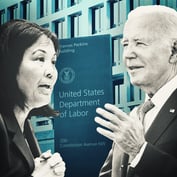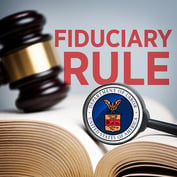The recent federal court decision in Florida striking down the Department of Labor’s guidance that declared rollover advice fiduciary advice “will force the DOL’s hand” in releasing a new fiduciary definition rule, likely by the end of summer, predicts Fred Reish, partner at Faegre Drinker.
Labor filed a notice of appeal Friday with the U.S. District Court for the Middle District of Florida, which decided the rollover case. The appeal would be heard by the U.S. Court of Appeals for the 11th Circuit.
The move was expected, Reish said.
“As a result, broker-dealers, investment advisers and insurance agents are left with uncertain outcomes for rollover recommendations,” Reish said. “If they do not continue to satisfy the requirements of the DOL’s PTE 2020-02 for rollover recommendations, they are at risk that the DOL will win the appeal and any recommended rollovers will be prohibited transactions. We will likely remain in this regulatory limbo for a year or more.”
Reish said he also expects Labor to release a proposal soon “to toughen the DOL’s PTE 84-24 for recommendations of annuities for rollovers.” With this plan, the DOL “will require more of both the insurance agents and the insurance companies.”
We caught up with Reish to check on how firms are complying with Labor’s fiduciary PTE after his colleague, Brad Campbell, stated in a recent webcast that the interpretation is not “dead” in the wake of the Florida ruling.
THINKADVISOR: What’s the latest with the DOL fiduciary PTE?
FRED REISH: A Florida federal district court found that the DOL’s interpretation of fiduciary advice for rollovers was not supported by the existing regulation.
While that was quite a blow to the DOL’s goal of providing a heightened standard of care for rollover recommendations, the court did find that, if an advisor is a fiduciary, the processes described in PTE 2020-02 were supportable.
For example, a fiduciary advisor would still need to have plan information and compare it to the investments, services and costs in a rollover IRA, in light of the needs and circumstances of the participant.
In addition, the court did not extend its ruling to conflicted recommendations to plans or IRAs; the holding was only about rollover recommendations. As a result, investment advice that is provided on a regular basis to plans and IRAs will still be fiduciary advice and, where there are financial conflicts, the protection of PTE 2020-02 will still be needed.








 April 18, 2023 at 11:04 AM
April 18, 2023 at 11:04 AM












 Copyright © 2024 ALM Global, LLC. All Rights Reserved.
Copyright © 2024 ALM Global, LLC. All Rights Reserved.